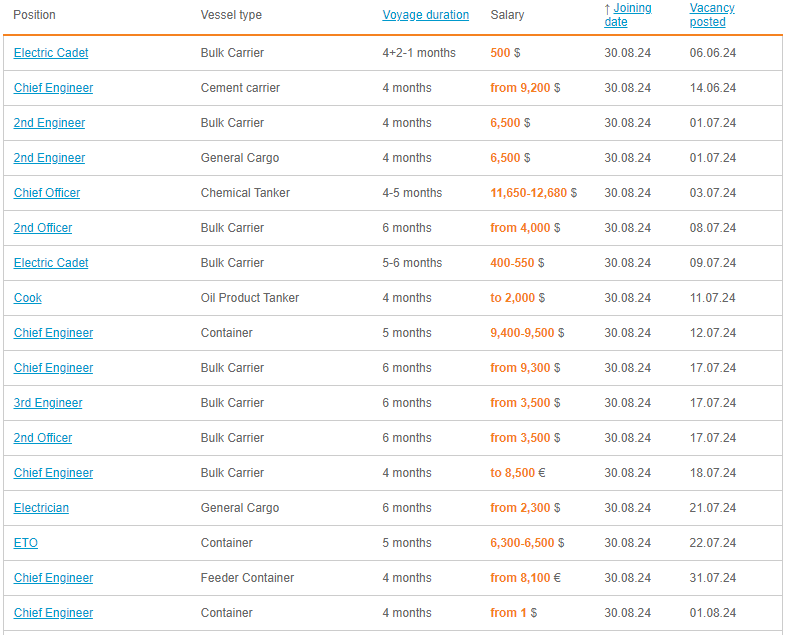Best Paying Fleet. How Much Do Seafarers Make In 2024?

The recent research by the ITF has shown that although the wage scale has increased in 2024, it still fails to keep pace with the living expenses. And that’s very true for ratings who quite often have to seek any work bites while being on shore leave. So how much do seafarers serving in different capacities really make today, and what fleet is the most rewarding?
THE WORLD'S HIGHEST WAGE
The highest pay a seaman could receive is USD 1,000.00 PER DAY! And all you need to get this money is to be a Master Mariner on a Jack-up Barge, says seamanmemories.com.
TANKER VS BULK CARRIER. ARE BENEFITS FAIRLY OBVIOUS?
The average monthly salary paid to a Master or a Chief Engineer ranges from $12,000 to $15,000. The salary spread established to tanker and bulk carrier employees stretches from $300 to $1,000 or more per month. That is because of the risks the tanker service involves like complicated inert gas systems which may interfere with seafarers’ health or even be life-threatening due to the toxic vapours. So, whether the game is worth the candle or not, it’s totally up to you. The salary analysis undertaken over the offers by Ukrainian and foreign companies posted on ukrcrewing.com.ua revealed this central tendency for various capacities.

- bulk carriers and container ships – $7,000 - $8,000 per month;
- tankers – $10,000 - $13,000 per month;
- offshore vessels – $200 - $300 per day.
If you search the most recent vacancies on ukrcrewing.com.ua (July 2024), you’ll see that a 2nd Officer or a 3rd Engineer in average make $3,000 - $4,000. Should we say that an eager searcher will also find $2,000 and $4,500 paid for the same duties?
- bulk carriers – $3,200 per month;
- container ships – $3,000 per month;
- dry-cargo carriers, universal cargo ships, passenger ships - about $1,700 per month;
- tankers – $4,500 - $5,000 per month;
- offshore vessels – from $140 per day.
A 3nd Officer or a 4tg Engineer can expect $2,700 - $3,500, says ukrcrewing.com.ua.
- container ships and bulk carriers – $2,500 - $2,900 per month;
- universal cargo ships – $1,300 - $1,700 per month;
- and tankers gain the lead as usual with $3,500 - $4,000 per month.
- dry-cargo carriers – $1,500 per month;
- oil tankers – $1,700 per month;
- oil platforms – $2,700 per month.
The lowliest paid jobs are Deck Cadet and Engine Cadet. Although seafarers comment some companies tend to give priority to cadets by giving them extra allowances. But keep in mind such allowances are granted in the sole discretion of a shipowner, and the fact that you experienced that privilege during your previous employment doesn’t always mean you’ll have it again next time.
Now, a Cook. Your incomes can vary widely from one vessel to another ranging up to a few thousand. Average DWT capacity vessels, for instance, are ready to pay about $1,800 for your service while some oil platforms attract Chief Cooks with a $5,000 salary per month. On average, a Cook could count on $2,500, whatever the vessel type.
OS, Motormen 2nd class, Wipers should expect about $1,000 - $1,200 per month for their work on dry-cargo carriers and conventional tankers, and a bit more (around $1,500) if they’re arranged for an LNG carrier.
Please note that the wages here show rough numbers only and reflect averages of actual job postings from ukrcrewing.com.ua and thoughts of some foreign analysts from crewtraffic.com and seamanmemories.com
IS ITF A GUARANTOR?
Every year the International Transport Workers' Federation updates the Wage Scale For Seafarers and 2024 is no exception. The ITF’s Minimum Wage Scale is available on crewtraffic.com where you’ll easily find hourly rates, basic pay, daily wage and even leave pay rates
Thus, experts say salaries covered by an ITF agreement are higher, and employment conditions are more fruitful if you get Seafarer’s Unions behind you because of their direct agreements with the ITF. For instance, the ITF recommends each hour of overtime should be compensated at a rate of 1.25 times the normal hourly rate based on a 48-hour working week and a maximum working week of 72 hours. Unfortunately, seamen say in actual life even ships covered by an ITF agreement sometimes drive a coach and horses through their contractual arrangements to pay less.
This is why we strongly advise that before you accept a position on board, you scrutinize your contractual terms, keep a sharp lookout for suspiciously high rates and tempting offers which in most cases would hide fraud or potential pitfalls like different penalties, limitations, and adverse working conditions.
Should you find yourself in such situation it is important to contact your Seafarer's Union, or seek free legal advice here to guide you through the best possible solution.
Who sets the minimum wage standards, and will there be a pay raise in 2025? Eager to know? Wait for our next article Factors Affecting Seafarers’ Wage Rates.
Personnel shortage: the shortage of officers in the world has reached a record high. Who are Ukrainian crewing companies looking for?




